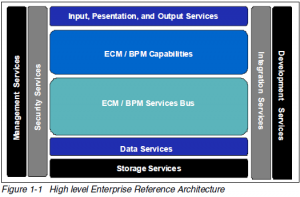IBM Filenet P8 Platform and Architecture: Difference between revisions
No edit summary |
No edit summary |
||
| Line 16: | Line 16: | ||
their relative interactions. | their relative interactions. | ||
[[File:IBM Filenet - core components.PNG|frameless| | [[File:IBM Filenet - core components.PNG|frameless|500px|left|IBM Filenet Core components]] | ||
[[File:IBM FileNet - Content Engine internal system architecture.PNG|300px|right|Content Engine internal system architecture]] | [[File:IBM FileNet - Content Engine internal system architecture.PNG|300px|right|Content Engine internal system architecture]] | ||
Revision as of 08:24, 4 April 2018
Core component architecture
IBM FileNet P8 Platform is the unified enterprise foundation for the integrated IBM FileNet P8 products. This chapter describes the core components of IBM FileNet P8 Platform, their architecture, data model, and associated security features.
Core components overview
IBM FileNet P8 Platform is a collection of tightly integrated components that are bundled together under a common platform. The broad functionality provided by these integrated components constitute an enterprise content and process management platform. Some of the key elements of this platform are a metadata repository, a process management repository, an out-of-the-box user interface for accessing content and process elements, and a storage framework that can support a wide range of storage devices and platforms.
To provide these services, the IBM FileNet P8 Platform relies on three core components:
- Content Engine (CE)
- Process Engine (PE)
- Workplace (WP) / Workplace XT (WP XT)
Figure 2-1 provides a high-level architectural view of these key components and their relative interactions.


